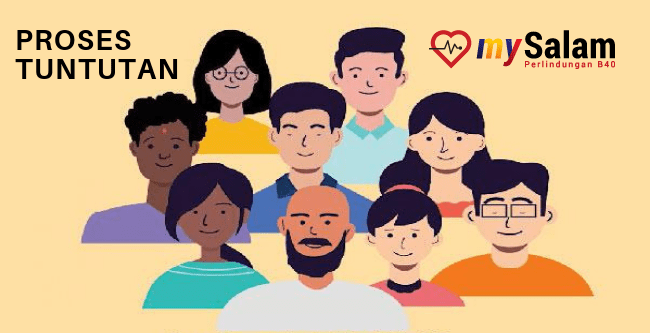April 19 – On the one hand, the government says that it urgently wants to help the poor through the mySalam health assistance programme; on the other, Putrajaya discriminates against the bottom 40 percent (B40) who are already ill.
Deputy Finance Minister Amiruddin Hamzah told Parliament recently that only two out of 1,094 claims made under mySalam received an RM8,000 lump sum payment, which equates to a shockingly tiny 0.2 percent approval rate.
Even if we give the government the benefit of the doubt and assume that 997 of the 1,094 claims are still being processed and were not necessarily rejected (since payouts have only been made for 97 claims), the approval of only two of those 97 claims for the RM8,000 cash still translates to a pathetic 2 percent. The other 95 claims have only received the RM50 daily hospitalisation benefit.
Why is mySalam’s coverage for the RM8,000 one-time payout so poor? How many claims did Great Eastern reject? On what basis were these claims rejected?
Is it because the applicants had pre-existing conditions from contracting a critical illness before the coverage period began on January 1, 2019? Or is it because their conditions, even if diagnosed after January 1, are not considered severe enough under the definitions of the 36 critical illnesses that mirror those in commercial health insurance?
It is unfortunate that mySalam chairman Johan Mahmood Merican, in his interview on the “Let’s Talk with Sharaad Kuttan” show, did not clarify the extremely low approval rate for the RM8,000 payout that is mySalam’s signature benefit.
Instead, he says that all B40 people aged 18 to 55 are covered because they are still eligible for the daily hospitalisation income replacement of RM50 – up to RM700 per annum at Ministry of Health (MOH) hospitals (university hospitals are excluded) – even if they have pre-existing conditions.
Johan points out that the mySalam is not meant to cover the cost of treatment since government hospitals already charge nominal rates, but to cover transport and to encourage the B40 to go to hospital because poor cancer patients, for example, often delay treatment because it means time away from work.
But this is exactly what MOH is doing with their Peka B40 programme that pays cancer patients an RM1,000 incentive to complete treatment at MOH hospitals. Peka B40 also provides transportation aid of RM500 for hospital treatment in the peninsula, and RM1,000 for Sabah, Sarawak, and Labuan.
So why the duplication in services? The government might as well remove the hospitalisation benefit from mySalam and give the money to Peka B40 so that the MOH programme can expand coverage to all B40, instead of only those aged 50 and above.
It is strange for Johan to stress the importance of “early treatment” for critical illnesses when mySalam only covers serious late-stage diseases like “end-stage liver failure”, “end-stage lung disease”, or a stroke that results in “permanent neurological deficit”.
Since mySalam excludes coverage for “very early” cancers, this means that the Finance Ministry is inadvertently encouraging people to seek cancer treatment late because Great Eastern will turn them away if they get diagnosed at an early stage.
If the Finance Ministry really wants to “immediately help” the poor with great urgency, why doesn’t mySalam cover those who are sick right now instead of waiting for people to get newly diagnosed after January 1?
According to the National Cancer Society of Malaysia (NCSM), about 20,000 people are newly diagnosed with cancer annually. Assuming that 40 percent of them are in the B40 category, this means that 8,000 people from this group get newly diagnosed every year. This leads to a total of 40,000 cancer patients among the B40 for the past five years. (A five-year period is chosen because Malaysia’ five-year cancer survival rates are very poor — more than half of patients for many cancers die within five years from diagnosis).
Assuming about 70 percent of them are aged between 18 and 55, this means that there are currently about 28,000 cancer patients whom mySalam can help immediately, without setting restrictive criteria for coverage like a certain severity of disease or diagnosis only from January 1, 2019.
This is only cancer, one of the 36 critical illnesses covered under mySalam. How many more thousands of other people who have contracted heart disease, kidney failure, lung disease or other critical illnesses over the past five years can the government help?
If indeed Great Eastern is rejecting claims because the applicants’ disease is not serious enough or because of pre-existing conditions, the insurance company’s limiting criteria are all the more ridiculous considering that the payout is only RM8,000.
Great Eastern should not be using the same strict conditions for RM8,000 claims under mySalam that it uses for commercial critical illness policies with far bigger payouts of RM100,000 or more.
The Finance Ministry needs to stop treating mySalam like a conventional insurance policy if it considers the scheme a social protection programme that truly covers everyone.

Boo Su-Lyn is a libertarian writer who believes in minimal state intervention in the economy and socio-political issues. Read her at boosulyn.com. Share your ideas with her at fb.com/boosulyn, tweet her @boosulyn, follow her lifestyle at IG @boosulyn, and watch her at youtube.com/c/boosulyn.
- This is the personal opinion of the writer or publication and does not necessarily represent the views of CodeBlue.








